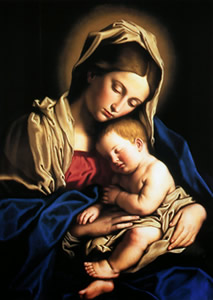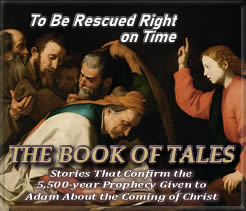Misconception #40 (Cont’d)
Mary the Mother of Jesus was Born Via a Virgin Birth Just Like Her Son
In The Gospel of the Birth of Mary, we find that Mary’s parents were named Joachim and Anna, both of whom had sprung from the royal lineage of King David. Mary’s father was a Galilean from Nazareth; her mother, from Bethlehem. Devoted members to the local Temple, they lived humbly in the sight of God, esteemed by everyone; yet for twenty years they remained childless.1
In time, although Joachim and his wife continually brought their offerings to the Temple, the townspeople began to question the efficacy of those offerings because they were still childless, citing the Scripture: “Cursed is everyone who doesn’t give birth to a male child in Israel.” So, to remove himself from the shame of his family’s predicament, Joachim retired from the service of the Temple and went to work in the fields as a shepherd.2
Sometime later, while Joachim was tending his flock, an angel appeared before him and said:
God wants you to know, Joachim, that He’s seen how you’ve been unjustly treated for being childless. And because He’s received your prayers and offerings, He sent me to tell you His purpose in all of this. Sometimes, when God shuts the womb of a woman, He has a special purpose in mind. He does it so He can open it again in an even more profound way. That way, such a birth won’t be seen as being a product of mere desire but as a gift from God.
Just look at the mother of your nation, Sarah: She was barren until later in her life, yet, even at her age, she brought forth Isaac, whose promised birth was a blessing to the nations.
Story Continues Below
Says Richard Price—the founder and CEO of Academia.edu—on his podcast In Depth With Academia:
Fish Tales (From the Belly of the Whale): Fifty of the Greatest Misconceptions Ever Blamed on The Bible is:
To hear Price’s book review of Fish Tales (From the Belly of the Whale), CLICK HERE.
To hear Kent and Zen Garcia talk about correcting biblical misconceptions, from September 9th, 2021, CLICK BELOW.
Story Continues From Above
The same thing happened to Rachel, who was such a favorite of God and so loved by Jacob; even she continued barren for many years before she gave birth to Joseph, who not only governed Egypt but also delivered many nations from perishing from hunger.
And who among the judges was braver than Samson or more devout than Samuel; yet both of their mothers were considered barren for a long time.
In the same way, then, your wife Anna will conceive in her advanced years and will provide you with a daughter that you’ll name Mary. According to your own vow, she’ll be devoted to the Lord from her infancy, being filled with the Holy Spirit from her mother’s womb…
And in time, just as she was uniquely born of one who was barren, so she will in an unparalleled manner—while yet a virgin—bring forth the Son of the Most-High. He’ll be called Jesus, and according to the significance of His Name, He’ll be the Savior of the world.3
How interesting is that? And how strange to think that such a controversial misconception as this, so divisive in the history of two great streams of the Christian Church, could actually have its roots in the scriptural record, after all.
And not only can this story be found in The Gospel of the Birth of Mary, but it can also be found in the very next text of The Lost Books of The Bible, called The Protevangelion, otherwise known as An Historical Account of the Birth of Christ, said to be written by James the Lesser, the half-brother of Jesus.
In The Protevangelion, James records his own version of the same events. According to him, the high priest barred Joachim from presenting any more offerings at the Temple, citing that it was illegal for him to do so because he was an Israelite with no children. Joachim was so embarrassed he fled to the wilderness without even telling his wife where he’d gone. And there he remained in prayer for several weeks, having determined in his heart that he wouldn’t go home until God had delivered him from his predicament.4
With no idea where her husband had disappeared to or why, a grief-stricken Anna took refuge in her garden, wearing her wedding dress, and there, under a laurel tree, she tearfully begged God to hear her prayers just as He’d heard Sarah’s so long ago and blessed her with the birth of Isaac.5
Soon afterward, an angel came to Anna and told her, “The Lord has heard your prayer, and you’ll conceive and give birth to a child who’ll be spoken of throughout the whole world.”6
Likewise, an angel appeared to Joachim with the good news of the impending birth of his child, and returning home, he was reunited with his wife once again.7 And the rest, as they say, is history.
So, not only does this story of Mary’s unique birth appear in the apocryphal record, but it appears there twice—back-to-back—as it is written: In the mouth of two or three witnesses, a thing is confirmed.8
No wonder the hearts and minds of the people have for all these centuries been so willing to embrace the idea that Mary, like her Son, was born in a miraculous manner. Even when many of the early Church Fathers tried to discredit and expunge such accounts from the official record, their influence remained indelibly etched in the memory traces of humanity.








